|
|
|
Sort Order |
|
|
|
Items / Page
|
|
|
|
|
|
|
| Srl | Item |
| 1 |
ID:
174794
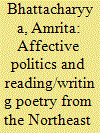

|
|
|
|
|
| Summary/Abstract |
Theorization of cultural and political issues of Northeast of India often creates a disengagement from the actual cultural performances produced in the region. This unique geo-cultural place is sometimes homogenized. In actuality, it is the home of diverse socio-cultural practices and performances. In the context of globalization, deforestation, Christianization, other internal clashes and external influences, material bodies, here, are continuously being rewritten in socio-cultural sphere. Non-representational theory considers poetry as an effective mode of exhibiting the virtual multiplicity of the nonrepresentational world. This paper will focus on exploring the corpus of Northeast Indian English poetry that focuses on social practices and bodily experiences to interpret the entire cultural flow of everyday life. As Non-representational Theory positions ‘affect’ as a central issue to individual and collective disposition in constituting the affective political discourse, this paper will also indicate some political imperatives by advancing a politics of hope in the realm of socio-political sphere.
|
|
|
|
|
|
|
|
|
|
|
|
|
|
|
|
| 2 |
ID:
188696
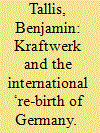

|
|
|
|
|
| Summary/Abstract |
Kraftwerk are widely recognised as one of the most important groups in the history of popular music – and for (West) German national identity in the 20th century. They have been labelled as both typically German and thoroughly cosmopolitan, but, rather than being paradoxical (as some have claimed), this tension reveals an under-explored international politics at work. Using the emerging approach of Multiplicity, I illuminate Kraftwerk’s international dimensions to develop the insight that all societies are inter-societal and all nations international. The article thus intervenes into an ongoing debate in International Political Sociology (IPS) that has seen calls to abandon ‘the international’ in favour of ‘the global’. In practice, this would also ignore ‘the national’ which, as Cultural Studies scholarship on Kraftwerk and recent sociological work shows, remains an important mode of meaning-making. Yet these same literatures dismiss cosmopolitanism or afford no constitutive role to the international, meaning they slide back into methodological nationalism. Using Multiplicity, I address both the national and the cosmopolitan elements of societal identity and suggest a newly co-ontological conception of identity and difference for International Relations (IR). Sketching Kraftwerk’s genesis, innovations, inspirations, influence and importance, I thus illuminate the inter-national politics of the musical ‘re-birth of Germany’.
|
|
|
|
|
|
|
|
|
|
|
|
|
|
|
|
| 3 |
ID:
191664
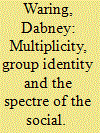

|
|
|
|
|
| Summary/Abstract |
The recent renaissance of uneven and combined development (UCD) has generally followed Justin Rosenberg’s formulation of the ‘international’, conceived as the inter-societal dimension of sociohistorical development. But Rosenberg’s ‘international’ rests on the conflation of distinct concepts, thus occluding other consequential registers of multiplicity. This paper (1) disentangles the concepts ‘social’, ‘societal’ and ‘political’; (2) demonstrates, using recent archaeological research, that complex social definedness preceded the sedentarisation of human groups; and (3) argues that social multiplicity constitutes a distinct dimension of causality that is interrelated with but irreducible to the territorial logics of societal and political multiplicity. In order to do this, it examines the role of the social (as non-territorial group identification) in the rise of Hellenic nationalism in colonial Cyprus. The paper concludes by suggesting a new path for UCD research in order to explore the full significance of multiplicity for IR theory, thus moving further out of the ‘prison of Political Science’.
|
|
|
|
|
|
|
|
|
|
|
|
|
|
|
|
| 4 |
ID:
182570
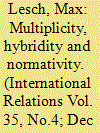

|
|
|
|
|
| Summary/Abstract |
In 2014, Germany became the 173rd state to ratify the UN Convention against Corruption (UNCAC) – after more than ten years of disputes in the German parliament. To make sense of the protracted debates about ratifying UNCAC, the article follows the recent introduction of Luc Boltanski’s pragmatic sociology to International Relations (IR). I argue that this approach opens new avenues for researching normativity in hybrid arrangements of multiple, overlapping orders of worth and through ongoing tests of the right evaluation of a situation. I show that the belayed ratification of UNCAC in Germany was the result of the hybridity inherent to norms against corruption. In the debates, members of the German parliament relied on competing normative inventories to translate the term ‘public official’ to the German context and to settle the meaning of corruption. This article contributes to IR norm research by unpacking normative multiplicity and contradictions that undergird international norms and disputes about them.
|
|
|
|
|
|
|
|
|
|
|
|
|
|
|
|
| 5 |
ID:
188701
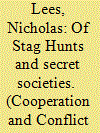

|
|
|
|
|
| Summary/Abstract |
In many circumstances where multiple, autonomous actors exist, cooperation is only a viable strategy if other actors also pursue a strategy of cooperation. Such situations can be characterised in terms of the Stag Hunt, based on a parable told by Rousseau. Although traditionally interpreted as a device for understanding how mutually beneficial cooperation can emerge, Harrison Wagner points out that would-be exploiters must overcome similar problems to succeed at subjugating others. Successful cooperation may have the ironic consequence of enabling deeper conflict within and between a multiplicity of societies. Despite its canonical status, the importance of the Stag Hunt for understanding the interaction between multiple societies may have been underestimated.
Nonetheless, rational choice theory alone cannot explain how cooperation-for-predation became established, while historical sociology’s conventional ‘materialist metanarrative’ of the origin of war and the state may have unduly neglected the role of gender relations. The phenomenon of men’s secret societies, found in many stateless societies, indicates that fraternal solidarity within coalitions of men competing to control women’s labour and bodies may provide a path to the nucleation of warlike states. If this is correct, it becomes clear that in many societies, men and women experience multiplicity in qualitatively different ways.
|
|
|
|
|
|
|
|
|
|
|
|
|
|
|
|
| 6 |
ID:
188698
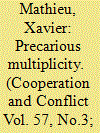

|
|
|
|
|
| Summary/Abstract |
This article investigates the portrayal by French policy-makers of the so-called Islamic State ‘foreign fighters’. I provide an in-depth analysis of the discursive construction of these ‘foreign fighters’ as different and detached from the (French) Self. I do so through a questioning of the notion of multiplicity, revealing how it exists precariously and the consequences this precariousness has on the notion itself. First, multiplicity emerges in ‘strange’ places as identities are being remodelled through new combinations. Second, the coexistence implied by multiplicity needs to be complexified to account for the way it helps preserve but also sometimes erase difference (and thus multiplicity itself). Finally, because of the precariousness of multiplicity, unexpected outcomes can be produced by the encounter with difference (such as the policy of non-repatriation of the ‘foreign fighters’). Overall, multiplicity can be usefully questioned by looking at these instances of instability and doubt. As such, this article shares the concerns expressed by critical scholars that multiplicity recreates problematic distinctions between inside and outside. As a response, my analysis contributes to an understanding of multiplicity as always in the making, revealing how various discursive strategies are used to temporarily and imperfectly stabilise boundaries.
|
|
|
|
|
|
|
|
|
|
|
|
|
|
|
|
| 7 |
ID:
184048
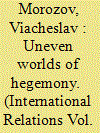

|
|
|
|
|
| Summary/Abstract |
The neo-Marxist literature on uneven and combined development has made significant progress towards a comprehensive theory of the international. Its point of departure is societal multiplicity as a fundamental condition of the international. This article identifies an important lacuna in the ontology of multiplicity: there is no discussion of what constitutes a ‘society’, or the basic entity capable of entering a relationship with other entities. Existing solutions, including those relying on relational sociology, gravitate towards ontological individualism. Building on poststructuralist neo-Gramscian theories, I propose to ground the conceptualisation of ‘society’ in the notion of hegemony. This implies a discursive ontology, which attributes the inside/outside dynamic to hegemonic formations rather than states or societies. Coupled with the understanding of hegemony as a scalar phenomenon, this ontology can account for the primacy of the state in modern times, while also enabling a research focus on other types of collectivities.
|
|
|
|
|
|
|
|
|
|
|
|
|
|
|
|
| 8 |
ID:
188697
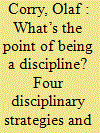

|
|
|
|
|
| Summary/Abstract |
While disciplinary identities are among the most fraught subjects in academia, much less attention has been given to what disciplinarity actually entails and what risks different disciplinary strategies involve. This article sets out a theory of disciplinarity that recognises not only their coercive but also their redeeming features, particularly in view of the coexistence of multiple competing disciplines and powerful transdisciplinary movements (such as rationalism). On this basis it identifies four disciplinary strategies and each is assessed in relation to the future of IR: (1) remaining a subdiscipline of Political Science (‘stay put’), (2) becoming an interdisciplinary field (‘reach out’), (3) dissolving into transdisciplinarity or abolishing IR (‘burn down’), or (4) establishing IR as a discipline in its own right (‘break out’). Rejecting the false choice of disciplinary constraint versus epistemic freedom, this framework allows IR and other subfields to more consciously consider a range of disciplinary strategies and to entertain the risks and affordances they each offer. The article concludes that a future independent discipline focused on the implications of ‘the international’ not just for politics but all fields – including disciplinarity – would make for a broader, more diverse IR, ultimately also better able to engage other disciplines.
|
|
|
|
|
|
|
|
|
|
|
|
|
|
|
|
|
|
|
|
|